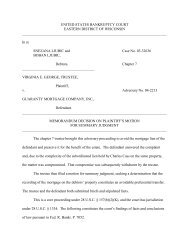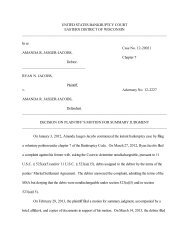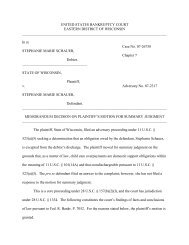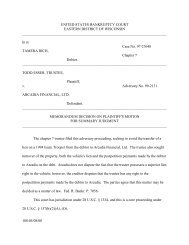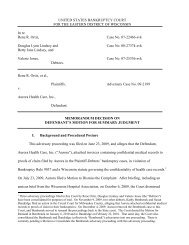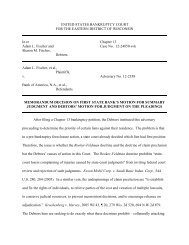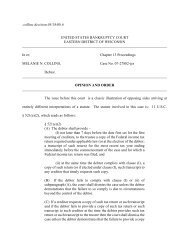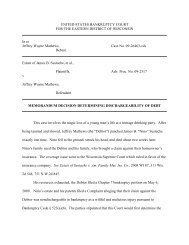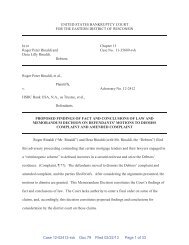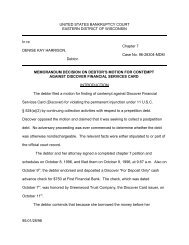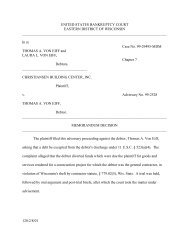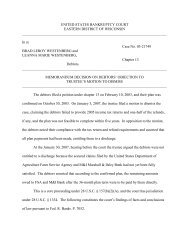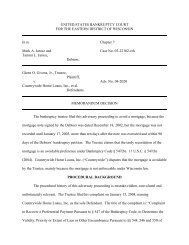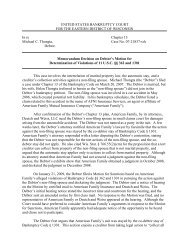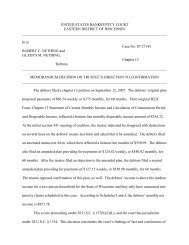In re American Toy & Furniture Co., Inc., Case No. 92-27686
In re American Toy & Furniture Co., Inc., Case No. 92-27686
In re American Toy & Furniture Co., Inc., Case No. 92-27686
You also want an ePaper? Increase the reach of your titles
YUMPU automatically turns print PDFs into web optimized ePapers that Google loves.
chapter 11 administrative claimants by moving ahead of other chapter 11 administrative<br />
claimants. The<strong>re</strong> probably will not be sufficient funds for all c<strong>re</strong>ditors of this priority.<br />
Administrative claimants a<strong>re</strong> those entities having claims under 11 U.S.C. § 503(b). For<br />
our purposes, administrative claims include “the actual, necessary costs and expenses of<br />
p<strong>re</strong>serving the estate, including wages, salaries, or commissions for services <strong>re</strong>nde<strong>re</strong>d after the<br />
commencement of the case.” 11 U.S.C. § 503(b)(1)(A). An administrative claimant with<br />
superpriority under § 507(b) must be paid in full befo<strong>re</strong> any other administrative claimant of the<br />
same level of priority <strong>re</strong>ceives payment.<br />
The controversy associated with granting a superpriority to an inadequately protected<br />
secu<strong>re</strong>d c<strong>re</strong>ditor arises from the language of § 507(b), itself. <strong>In</strong> fact, § 507(b) has been called a<br />
“prism in the fog,” <strong>In</strong> <strong>re</strong> Callister, 15 B.R. 521, 526 (Bankr. D. Utah 1981); and the endeavor to<br />
determine whether an inadequately protected secu<strong>re</strong>d c<strong>re</strong>ditor should be granted a superpriority<br />
has been described as “a complex maze of ambiguous statutory provisions and opaque,<br />
inconsistent case law.” Baybank-Middlesex v. Ralar Distributors, <strong>In</strong>c., 69 F.3d 1200, 1202 (1 st<br />
Cir. 1995), aff’g <strong>In</strong> <strong>re</strong> Ralar Distributors, <strong>In</strong>c., 166 B.R. 3, 4 (Bankr. D. Mass. 1994)<br />
(“Resolution of the controversy involves application of the obscu<strong>re</strong> language of section 507(b) to<br />
the elusive concept of adequate protection.”).<br />
To further the confusion, § 361(3) of the <strong>Co</strong>de prohibits granting adequate protection to a<br />
secu<strong>re</strong>d c<strong>re</strong>ditor in the form of an administrative expense:<br />
When adequate protection is <strong>re</strong>qui<strong>re</strong>d . . . of an inte<strong>re</strong>st of an entity in property, such<br />
adequate protection may be provided by —<br />
(1) <strong>re</strong>quiring the trustee to make a cash payment . . .;<br />
(2) providing to such entity an additional or <strong>re</strong>placement lien . . .; or<br />
(3) granting such other <strong>re</strong>lief, other than entitling such entity to compensation<br />
82:2/24/97 -6-



